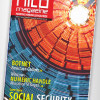Scientists Publish Digital Music Security Research without incident
Although a team of scientists published their controversial research detailing security flaws in a major digital music security initiative without incident today, the leader of that research team said the publication represented a "very partial victory." Princeton University Professor Edward Felten and his colleagues presented their findings detailing the inner workings, and failings, of the security features created under the Secure Digital Music Initiative (SDMI) at a security conference here this evening. But Felten warned that the battle he and others fought to bring the research to the public "is not a battle we can afford to fight every time we want to publish a paper."
Felten was originally set to unveil the research at an Internet security conference in April, but cancelled those plans, apparently in response to assertions by the Recording Industry Association of America (RIAA) that publishing the data could violate the controversial Digital Millennium Copyright Act (DMCA)....
Scientists Publish Digital Music Security Research
By David McGuire, Newsbytes
A cadre of groups led by the San Francisco-based Electronic Frontier Foundation (EFF) responded by filing suit, asking a federal judge to rule that the DMCA - which establishes civil and criminal penalties for people charged with violating copyrights online - cannot be used to chill the release of scientific research.
Under the DMCA, people who provide information about how to violate copyrights can be just as liable as those who actually misappropriate copyrighted material.
Although the RIAA has since said that it has "no objection whatsoever" to the publication of the paper, EFF Executive Director Shari Steele said earlier this week that EFF will continue to pursue the case, regardless of what happens to professor Felten.
After Felten research team member Scott Craver detailed the team's findings this evening, Felten joined a panel of legal experts who spoke out against some of the more stringent provisions of the DMCA.
The DMCA "sets up a system where the government out-sources the censorship of science," EFF attorney Cindy Cohn said today. Cohn said that, under the DMCA, scientists essentially must ask industry permission before publishing the results of their research on copyright protection schemes.
Click here to continue reading this article at NewsBytes.com.






































































